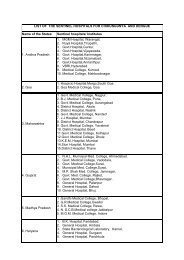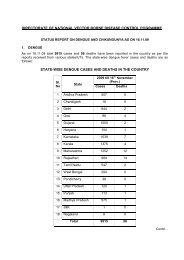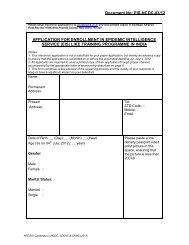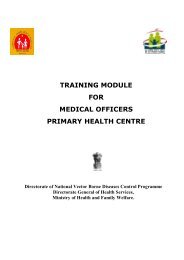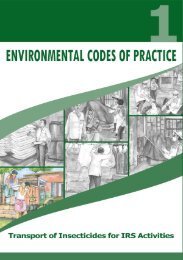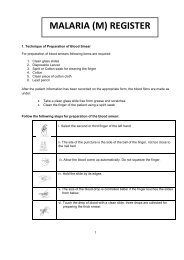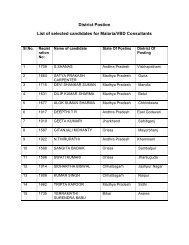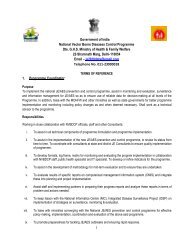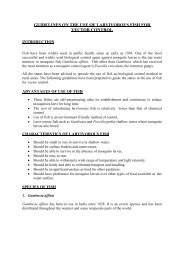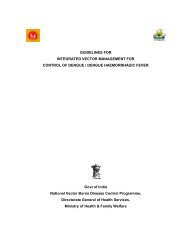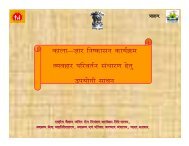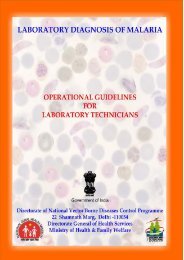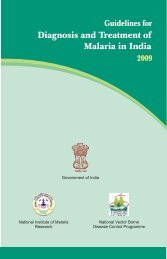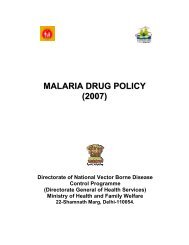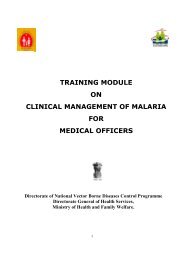National Project Implementation Plan - NVBDCP
National Project Implementation Plan - NVBDCP
National Project Implementation Plan - NVBDCP
Create successful ePaper yourself
Turn your PDF publications into a flip-book with our unique Google optimized e-Paper software.
World Bank will review of the annual audited project financial statements<br />
(which will include the funds transferred by <strong>NVBDCP</strong> to the States, along<br />
with other central level project expenditures), field visits and desk reviews<br />
of MIS information on staffing and training, review of standard costs and<br />
units as well as training programs; and a review of the sample of audit<br />
reports which will be received by the <strong>NVBDCP</strong>.<br />
Financial management capacity building activities at state /district and<br />
central level.<br />
Annual Lot Quality Assurance Sample Surveys confirming the availability of<br />
trained village level providers and thereby confirming that the training took<br />
place and is benefiting the implementation of the programme). These<br />
surveys will include the same sample districts as being reviewed by the<br />
independent consultants.<br />
Bi-annual Technical Program reviews to the satisfaction of the World Bank.<br />
During early implementation review, based on the results of the integrated<br />
implementation and fiduciary review and a comparison of the actual costs with<br />
the standard cost, this method of financing, the standards costs and assurance<br />
mechanism will be assessed by World Bank and redesigned, if necessary.<br />
This approach is considered more appropriate as it integrates implementation<br />
and fiduciary review and given the relatively lower risk associated with the<br />
activities to be financed at the decentralized level and limited financial<br />
exposure per district. In addition the financial exposure on decentralized<br />
expenditure in Phase I of the project is only estimated to be USD 12 million (Rs<br />
480 million). There will however, be a residual risk given (a) the decentralized<br />
nature of operations; (b) delayed implementation in certain districts leading to<br />
standard costs being higher than actual expenditure, and (c) internal control<br />
weakness in some of the districts. The sample of coverage in the integrated<br />
review will be reviewed based on the findings of the review in the first one<br />
year. The details of standard costs- units, unit cost and basis of determination<br />
are given in Chapter 4. These will be reviewed at project effectiveness for this<br />
component and may be revised for phase I, if considered necessary.<br />
Financial Reporting and Disbursement Arrangements: The project will submit<br />
quarterly interim unaudited financial reports (IUFR) in the agreed formats,<br />
which will reflect the central level expenditures (including those incurred by the<br />
procurement agent and research institutions); the grants transferred to states<br />
for decentralized project activities and the standard cost of the selected<br />
decentralized activities to be financed by IDA27. The IUFR will be submitted<br />
within 45 days of the end of each quarter. Reimbursement by IDA will be made<br />
annually using report-based disbursement, as for the project as a whole. The<br />
IUFR at the end of the financial year will be the basis for reimbursing MOHFW;<br />
27 The standard cost of the selected decentralized activities to be financed by the World Bank will<br />
be calculated on annual basis and presented in the agreed format of IUFR for the last quarter of<br />
the financial year.<br />
117



